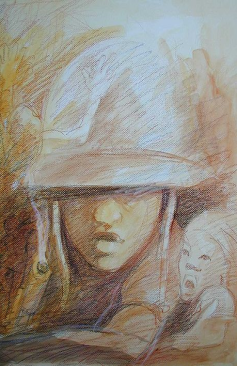International Day of the African Child: A Tragic Tale for the Children of the Continent
By Joseph Kaifala
Published on June 16, 2014

June 16 is the day of the African child, but every year the tale of the African child in comparison to other children of the world is a pitiful and tragic rhapsody. The day itself was born out of the 1976 massacre of school children demanding their right to proper education in apartheid South Africa. The Organization of African Unity (OAU), precursor to the African Union, consecrated the day in 1991 to commemorate the resilience of the school children of Soweto who matched to protest the imposition of Afrikaans in schools. None who has seen the iconic image of the murdered twelve-year old Hector Pierterson carried in the arms of his comrade on that god-forsaken day can easily efface it from memory. However, it is an image regrettably representative of the state of the African child even today.
In fact, inadequate or lack of education is one of the most appalling problems confronting Africa’s children. Many children grow up without ever entering a classroom or obtaining formal education. Sub-Sahara Africa remains home to more than half of the number of children still out-of-school in the world. Among children who enroll, the dropout rate is also higher in Africa. According to the Millennium Development Goal Report (2013), slightly more than two out of five children who enrolled in primary school 2010 will not make it to the last grade. Many of those who make it through school graduate without the ability to formulate simple sentences due to the poor quality of education received. All this is happening in view of international and regional treaty obligations to provide free fundamental education.
In a few African countries children are still forced to serve combatants roles in flagrant contravention of treaty protection and fundamental human rights. In the Democratic Republic of Congo (DRC), Central African Republic, Libya, Mali, South Sudan, Somalia, etc., children are engaged on frontlines to commit horrendous crimes and other human rights violations. At the end of these senseless armed conflicts, many former child combatants are abandoned to the further lashing of post-traumatic stress disorder. Those who remain somewhat intact find it hard to obtain employment due to the fact that they missed their formative years and the opportunity to acquire marketable skills. Some former child combatants remain outcasts in communities where they had previously committed outrageous crimes.
Other children who are fortunate enough to avoid conscription into combatant roles become victims of the violent lunacies pervading the continent. Even as we observe this day of the African child, more than 200 kidnapped school girls remain in the possession of those morally haram angels of death from the bosom of jahanama called Boko Haram. In many conflicts on the continent girls are targeted victims of rape or use as so-called bush wives. Consequently, violence against girls and women with impunity is rampant in many countries. In post-conflict societies such as Liberia and Sierra Leone young girls are still susceptible to rape and other sexual abuses with very little protection. Sometimes those given the obligation to protect children against abuse are the ones who perpetrate some of the worst crimes against them. Social and institutional gender disparities all over the continent are also limiting the advancement of girls and the potential of women.
Child labour is another a major problem on the continent even though many African countries have acceded to the International Labour Organization (ILO)’s Worst Forms of Child Labour Convention 182 (2000), designed to prohibit and eliminate just that–the worst forms of child labour. Children who should be in classrooms are seen in the streets of major African cities hawking goods for pittance. Many of the children have been placed in the situation because they suddenly have to take care of orphaned siblings or an ill parent. As these children parade the streets making a few cents here and there, they are also exposed to merciless predators lurking to prey on them. Other children work in conditions not far removed from servitude for meager pay in plain view of governments who are either indifferent or completely obdurate.
Therefore, the day of the African Child will become meaningful only when African leaders take proactive measures both at national and regional levels to improve the lots of children on the continent. African leaders must pursue full realization of their treaty obligations under the Convention on the Rights of the Child (including additional protocols) and the African Charter on the Rights and Welfare of the child, especially as it pertains to free fundamental education and protection in armed conflicts. When the continent fails to educate its children, it not only sustains a generation of illiterates, it subsequently maintains a vicious circle of poverty and underdevelopment. Africa must not continue to dig its own burial pit by constantly ignoring calls to invest in children–the future.
The Author

Joseph Kaifala is founder of the Jeneba Project Inc. and co-founder of the Sierra Leone Memory Project. He was born in Sierra Leone and spent his early childhood in Liberia and Guinea. He later moved to Norway where he studied for the International Baccalaureate (IB) at the Red Cross Nordic United World College before enrolling at Skidmore College in upstate New York. Joseph was an International Affairs & French Major, with a minor in Law & Society.
He holds a Master’s degree in International Relations from the Maxwell School at Syracuse University, a Diploma in Intercultural Encounters from the Helsinki Summer School, and a Certificate in Professional French administered by the French Chamber of Commerce.
Joseph was an Applied Human Rights Fellow at Vermont Law School, where he completed his JD and Certificate in International & Comparative Law. He is recipient of the Vermont Law School (SBA) Student Pro Bono Award, Skidmore College Palamountain Prose Award and Skidmore College Thoroughbred Award.
Joseph was a 2013 American Society of International Law Helton fellow. He served as Justice of the Arthur Chapter (Vermont Law School) of Phi Alpha Delta Law Fraternity International. He is a member of the Washington DC Bar.
Article picture: Child Soldier in the Ivory Coast”, Gilbert G. Groud, 2007. Source: Wikipedia


